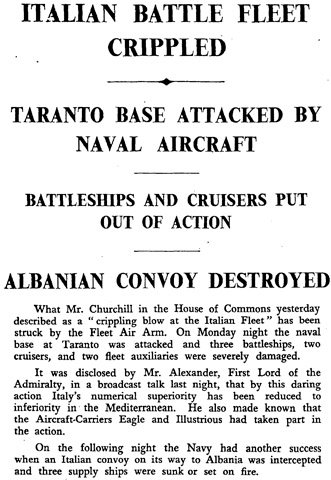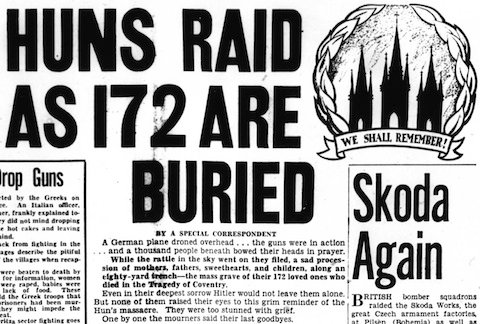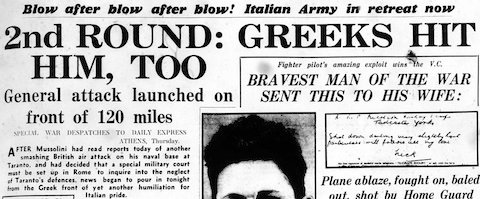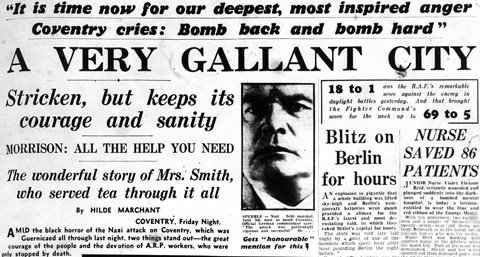
British and Allied forces have been having a good week, at Italy's expense. The Italians lost Gallabat (in the Sudan), a division in the offensive against Greece and much of a convoy taking supplies to Albania. The greatest Allied success was the carrier strike against the Italian naval base at Taranto, which took place on Monday night (The Times, 4). Three battleships were severely damaged. Last night the First Lord of the Admiralty, A. V. Alexander, told the nation via the BBC (and reported here on page 2) that whereas before the attack the Italian battle fleet had a numerical superiority in the Mediterranean, it is now inferior to the Royal Navy.
For reasons best known to themselves the Italians did not seek to exploit their superiority and they had remained immobile behind the defences of their harbour. Even that, however, had failed to protect them. Within their inglorious shelter the Italian battle fleet had suffered a defeat which could only have been redeemed in the public mind had that fleet shown itself willing to accept battle at sea.
The Italian News Agency has a somewhat different view of the air raid, calling the British account 'clap-trap' and a 'shameless fraud' (3):
If there had not been an urgent necessity to inject optimism into a depressed public opinion Churchill ought to have had the elementary prudence to study the Italian official communiqué of November 12, which said that only one unit was in any way extensively damaged, and added that there were no victims. It is evident that if the massacre of ships imagined by Churchill had really taken place there would have been a number of victims, unless we suppose that on board Italian warships there are no crews.
The truth is that 'the invincible British Navy has not yet scored a single success, however modest'. Who is telling the truth?
Elsewhere in the world today, Japan is attracting a bit of attention. The Times reports on 'Japanese hopes of peace' (3), after an emissary to China returned several weeks ago and an Imperial conference considered the matter. The official reports are bland; The Times's correspondent is reduced to interpreting 'The Emperor's nod for peace' in response to a remark by US Ambassador Joseph Grew: he showed his 'approval of that peaceful sentiment by nodding emphatically': 'In Japan such incidents attract and deserve attention'. Equally vague, though more worrying, is Soviet Foreign Minister Molotov's current visit to Berlin. Press speculation in Japan suggests that it will 'strengthen the Axis' and may even develop into 'an anti-Anglo-American front'.
Coincidentally, the Manchester Guardian reports today (5) that the RAF has reinforced its forces in south-east Asia, and apparently even more importantly a new post has been created to command them: Commander-in-Chief Far East. The first appointee is Air Chief Marshal Brooke-Popham, who will have overall command of air forces in Malaya, Burma and Hong Kong. It's doubtful whether this action would mollify Labour MP Philip Noel-Baker, who pressed R. A. Butler, Under-Secretary of State for the Foreign Office, in the House of Commons yesterday over the continuing supply of oil to Japan (7). After being informed by Butler that Chinese civilian casualties in the Japanese bombing of Chongqing amounted to about 2500 dead until the end of August, Noel-Baker asked:
Is the Minister not aware that civilians were killed in tens of thousands? Is it not advisable that, whatever other companies do, British companies should not supply oil for this butchery?
According to Butler, however, the 'oil position is an international one and very complicated', so it's not as simple as that. He doesn't reply to Noel-Baker's suggestion that British oil companies sell their oil to Britain instead and 'not for the bombardment of Chungking'.
Of course, there is a lot about bombing in Europe, too. But it doesn't seem to be the focus of such concentrated attention as it was a few weeks ago. The Guardian has a couple of paragraphs on Bomber Command operations on Tuesday night, including raids on 'oil plants at Gelsenkirchen and Cologne, the inland port of Duisburg-Ruhrort, and railway centres and factories in the Ruhr and near Cologne' (8). It also notes that the RAF will be getting 'Forty of the four-engined "flying fortress" bombers' for Christmas, and possibly the older of the Americans' very secret bombsights as well.
And there's the German bombing of Britain. There are stories about the effectiveness of British defences ('Four bombers shot down. Fruitless night and day attacks', from The Times, 4). There are also ones about civilian courage under fire, like this one from the Guardian, ('London cinema bombed. Audience's coolness', 7):
Girl ushers tore up their blouses to tend wounded people in the darkness when a high-explosive bomb partially demolished a London cinema during Tuesday night's raids. Seven people were killed and rescue work was carried on to free more people whom it was feared had been trapped under the wreckage.
Ernest Barker, chairman of the Community Centres and Associations Committee of the National Council of Social Service, writes to The Times (2) to warmly commend another correspondent's account of 'Neighbour's Leagues' in Leicester. He has heard this called 'the Good Neighbour Movement' elsewhere, and thinks it 'another and a fine example of that invincible instinct for self-help and voluntary organization which is a gift of our people':
The citizens of Leicester, and other cities, are knowingly distilling out a soul of goodness from the lowering evil of air-warfare.
But there are also less wholesome stories, such the arrest of a London ARP demolition worker for looting, reported by the Guardian (7). True, in this case it was only a matter of three books. But perhaps more worrying is the revelation that London County Council has a 'chit' system for ARP workers, whereby salvage workers can take away 'items of little value' from bomb sites after getting authorisation from the 'incidents officer in charge'. H. notes that demolition work 'demands the highest discipline' (3), such as is only found in the armed forces. But the Army has its own tradition of condoned pilfering, known as 'scrounging', and so even sending soldiers in would not be a panacea. What is needed are 'very severe examples':
There is a sort of impression that things lying losely [sic] about may be picked up by anyone, as instance the case the other day of a man who was sent to prison for looting some valuable furs from a wrecked house. It is this impression which must be checked firmly if, to the very great misfortunes suffered by bombed-out victims, is not to be added that of grievous injury by their own countrymen.
A last note from the Guardian (7):
It may now be stated that in recent air raids in the Midlands the following have been bombed:--
Birmingham: Cathedral, Bristol Street Methodist Church, Corporation Street.
Coventry: Cathedral, St. Mary's Hall.
An incendiary bomb damaged the nave of Coventry Cathedral but -- fortunately -- 'prompt action by spotters and firemen confined a fire to a small area'.
![]() This work is licensed under a Creative Commons Attribution-NonCommercial-NoDerivatives 4.0 International License.
Permissions beyond the scope of this license may be available at http://airminded.org/copyright/.
This work is licensed under a Creative Commons Attribution-NonCommercial-NoDerivatives 4.0 International License.
Permissions beyond the scope of this license may be available at http://airminded.org/copyright/.





Neil Datson
I recollect hearing an old con on a Radio 4 programme reminiscing about the glory days of the blitz. This man - I don't recollect his name - had been a notorious gangland thug in the 50s and 60s. For him the blitz had been a purely positive episode, which had launched thousands of successful criminal careers.
He recollected that it had been easy to loot bombed houses and shops. Casual enquiries as to legality could be brushed aside. Meanwhile the police and authorities had far bigger issues to deal with.
Pingback:
Airminded · Friday, 15 November 1940
Chris Williams
Mark Roodhouse's long-awaited book on the WW2 black market is likely to be along some time next year. This might tell us a bit more about the relationship between the war and organised crime.
Brett Holman
Post authorChris:
Great, now you've got me long-awaiting his book too!
Pingback:
Airminded · Saturday, 16 November 1940
Pingback:
Airminded · Tuesday, 19 November 1940